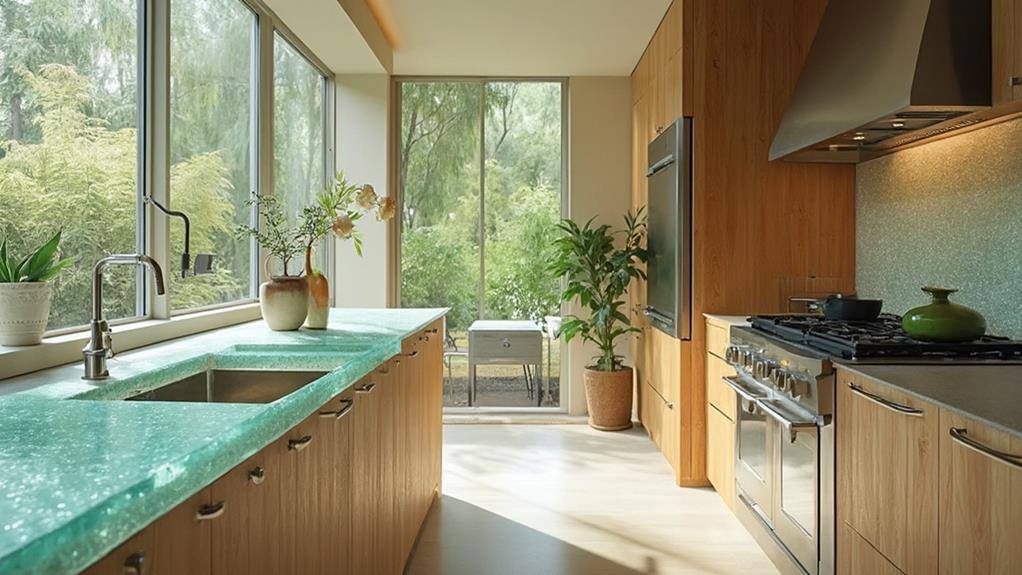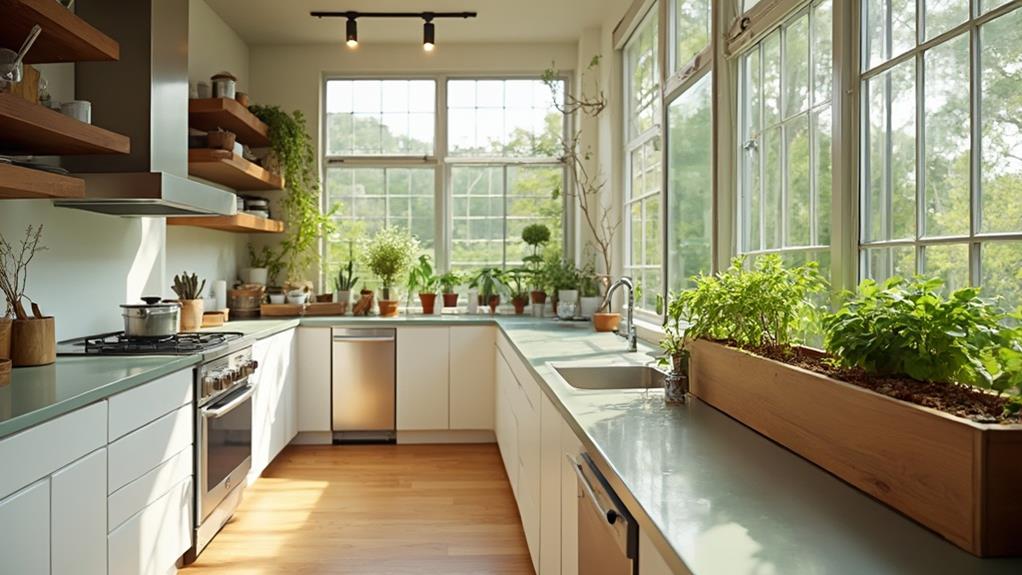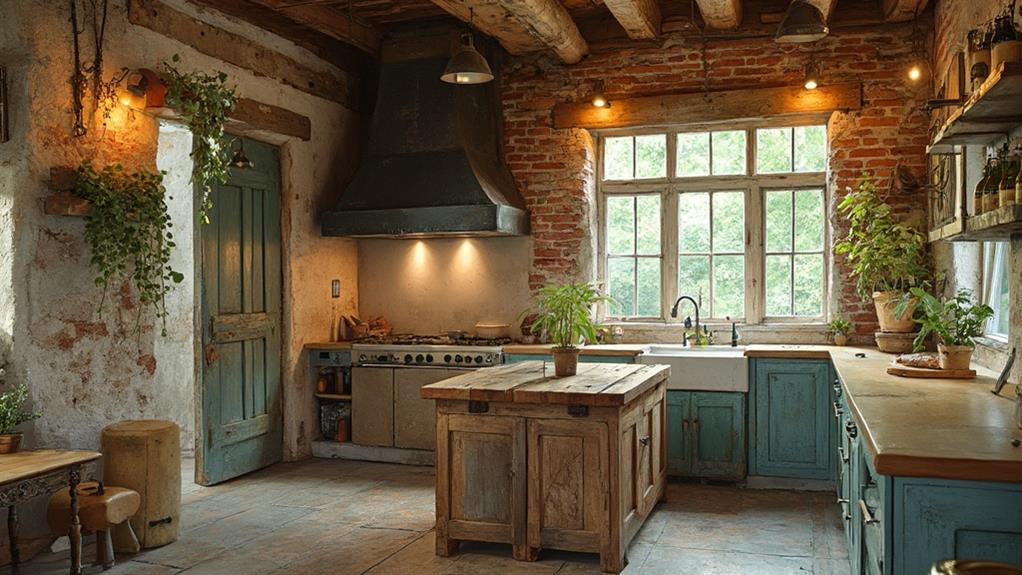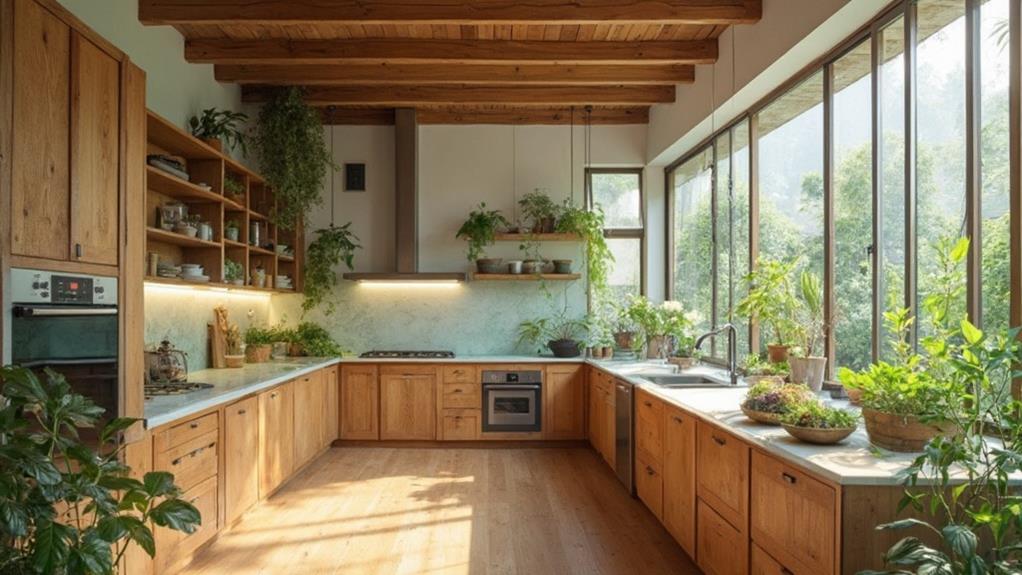An eco-friendly kitchen remodel combines sustainable materials with energy-efficient appliances and water conservation strategies. You can choose from countertops made of recycled glass, bamboo, or reclaimed wood, and opt for flooring like cork or bamboo. Install ENERGY STAR certified appliances, including refrigerators and dishwashers, to reduce energy consumption. Low-flow faucets and dual-flush toilets help conserve water. Incorporate recycled and reclaimed materials for fixtures and decor, adding unique character to your space. During renovation, focus on waste reduction by repurposing or donating usable items and properly sorting debris. Dive deeper to discover more ways to create a stunning, sustainable kitchen.
Sustainable Countertop Options

When it comes to sustainable countertop options, you'll find a variety of eco-friendly materials that don't sacrifice style or durability. Recycled glass countertops offer a unique, colorful appearance while repurposing waste materials. They're heat-resistant and non-porous, making them easy to clean and maintain.
Bamboo countertops provide a warm, natural look and are highly renewable. Bamboo grows quickly and can be harvested without killing the plant. It's also resistant to water damage and scratches, making it a practical choice for busy kitchens.
Reclaimed wood countertops add character to your kitchen while giving new life to old materials. They're durable and can be sealed to resist stains and moisture. Each piece tells a story, creating a one-of-a-kind look for your space.
For a sleek, modern aesthetic, consider paperstone countertops. Made from recycled paper and non-petroleum resin, they're heat-resistant and durable. They come in various colors and have a matte finish that's easy to maintain.
Lastly, consider cork countertops. They're renewable, biodegradable, and naturally antimicrobial. Cork is also heat-resistant and provides a soft, cushioned surface that's comfortable to work on.
Energy-Efficient Appliances
Five key appliances should be your focus when upgrading to energy-efficient options in your eco-friendly kitchen remodel. Start with the refrigerator, as it's constantly running and consumes the most energy. Look for ENERGY STAR certified models, which use up to 15% less energy than non-certified ones.
Next, consider an induction cooktop, which is 90% energy-efficient compared to gas or electric stoves. For your oven, choose a convection model that circulates hot air, reducing cooking time and energy use by 20%.
Don't forget the dishwasher – ENERGY STAR certified models use 12% less energy and 30% less water than standard ones. Lastly, upgrade your range hood to an energy-efficient model with LED lighting.
When selecting these appliances, pay attention to their EnergyGuide labels, which provide estimated annual operating costs and energy consumption. By choosing energy-efficient appliances, you'll not only reduce your carbon footprint but also save on utility bills. Remember to properly dispose of your old appliances through recycling programs or donation centers to minimize waste and environmental impact.
Eco-Friendly Flooring Choices

Numerous eco-friendly flooring options can transform your kitchen while minimizing environmental impact. Consider bamboo flooring, a rapidly renewable resource that's durable and stylish. It's available in various colors and finishes, making it easy to match your kitchen's aesthetic.
Cork flooring is another sustainable choice. It's harvested from the bark of cork oak trees without harming them. Cork is naturally antimicrobial, comfortable underfoot, and provides excellent insulation.
Reclaimed wood flooring offers a unique, rustic look while repurposing existing materials. It's an excellent way to add character to your kitchen and reduce demand for new lumber.
For a more modern look, consider linoleum. Made from natural materials like linseed oil, cork dust, and wood flour, it's biodegradable and long-lasting. Linoleum comes in numerous colors and patterns, allowing for creative designs.
If you prefer tile, opt for recycled glass or ceramic tiles. These materials reduce waste and often incorporate post-consumer content. They're durable, easy to clean, and can add a pop of color to your kitchen.
When selecting your eco-friendly flooring, consider factors like durability, maintenance requirements, and local availability to ensure the best fit for your kitchen remodel.
Water Conservation Strategies
Water conservation is a crucial aspect of any eco-friendly kitchen remodel. To reduce your water usage, start by installing low-flow faucets and aerators. These devices can cut your sink's water flow by up to 60% without compromising functionality.
Consider a dual-flush toilet if you're remodeling an adjacent bathroom, as it uses different amounts of water for liquid and solid waste.
For your dishwasher, choose an ENERGY STAR certified model that uses less water and energy. These appliances can save up to 3,870 gallons of water over their lifetime. Install a under-sink water filtration system to eliminate the need for bottled water, reducing plastic waste and transportation emissions.
Incorporate a graywater system to reuse water from your sink for watering plants or flushing toilets. This can save hundreds of gallons of water annually. Don't forget about fixing any leaks in your plumbing during the remodel. Even small leaks can waste thousands of gallons per year.
Lastly, consider adding a rain barrel outside your kitchen window to collect rainwater for outdoor use, further reducing your reliance on treated water.
Recycled and Reclaimed Materials

Incorporating recycled and reclaimed materials into your kitchen remodel isn't just environmentally responsible; it's also a great way to add character and uniqueness to your space. Consider using reclaimed wood for your flooring, cabinets, or countertops. This not only reduces demand for new timber but also brings a rustic, warm aesthetic to your kitchen.
Recycled glass countertops are another eco-friendly option, offering durability and a wide range of colors and patterns. You can also opt for recycled metal fixtures and hardware, which often have a distinctive patina that adds depth to your design.
Don't overlook salvaged items like vintage sinks, light fixtures, or cabinet doors. These pieces can serve as focal points and conversation starters in your new kitchen. For backsplashes, consider using recycled tiles made from glass, ceramic, or even plastic.
When selecting appliances, look for those made with recycled content. Many manufacturers now offer options that incorporate recycled materials in their production. By choosing these products, you're supporting a circular economy and reducing waste in landfills.
Waste Reduction During Renovation
Renovation debris often ends up in landfills, but you can significantly reduce this waste with careful planning and smart choices. Start by creating a detailed plan for your kitchen remodel, identifying which elements can be repurposed or donated. Consider selling or giving away appliances, cabinets, and fixtures that are still in good condition.
When demolishing, be selective and careful. Instead of tearing everything out, salvage what you can. Remove cabinets and countertops intact, as they might be useful elsewhere. Sort debris into separate piles for recycling, reuse, and disposal. Many materials, like metals, wood, and concrete, can be recycled or repurposed.
Opt for materials with minimal packaging and order only what you need to avoid excess. If possible, choose products made from recycled content. Use reusable containers for storing small items and tools during the renovation process. Consider renting tools instead of buying new ones for one-time use.
Work with contractors who prioritize waste reduction and have experience in eco-friendly practices. They can help implement strategies to minimize waste and maximize recycling throughout the renovation process.
Conclusion
You've now got a wealth of ideas for your eco-friendly kitchen remodel. By choosing sustainable materials, energy-efficient appliances, and water-saving fixtures, you'll create a beautiful space that's kind to the planet. Remember, every green choice counts. Did you know that Energy Star certified dishwashers use 12% less energy and 30% less water than standard models? That's a significant impact on both your utility bills and the environment. Start your sustainable kitchen journey today!

